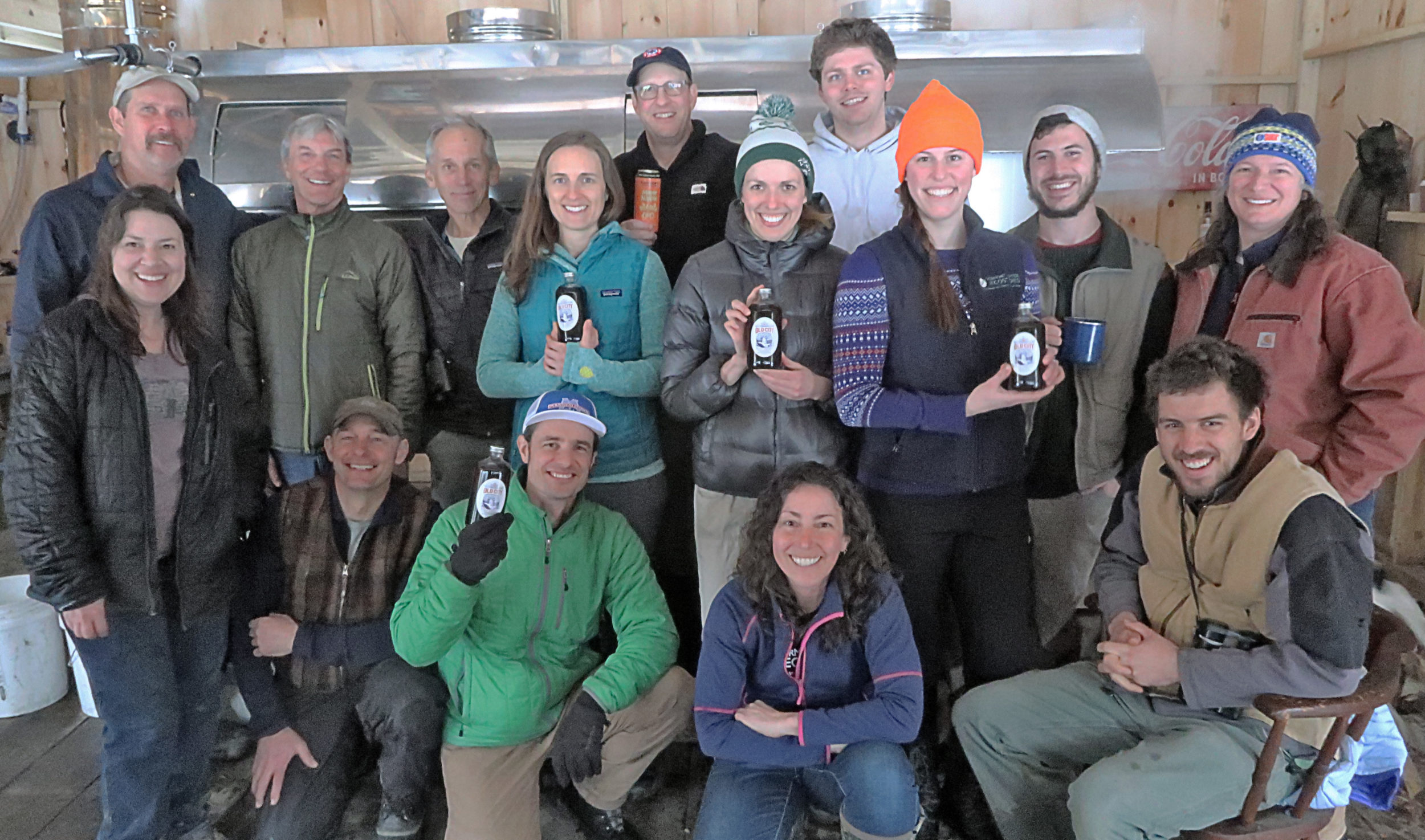
VCE’s pre-COVID staff outing in early March found us lending a hand at Pat Kelly’s (back row, 1st on left) Old City Syrup sugarhouse in Strafford, VT. / © Aaron Dotter
April in the Northeast is an unsettled, if exhilarating, month. Snow showers transition to rain showers (often on the same day), spring ephemerals poke through the leaf litter, and our long-awaited migratory birds appear — slowly at first, then in exciting pulses — to renew our landscapes with their sounds and colors. This particular April, however, finds us humans stuck in our own unsettling transition, in a kind of surreal limbo as our usual spring routines are upended by the COVID-19 pandemic. Here at VCE, we are optimistically seeking creative approaches to our wildlife conservation work, while simultaneously taking care of ourselves, our families, and our communities. We’re touching base now to update you on how we’re faring, and how we expect VCE’s work to unfold during the weeks ahead.
First, please know that VCE’s #1 priority in the short term is to fully support our staff transition to working from home, i.e, to relieve stress, accommodate everyone’s involvement in and service to their communities, and remove the pressure of anyone having to use personal leave to care for an ill relative or otherwise support family. We know that VCE’s greatest asset — with our constituents close behind, of course — is our staff, and we will steadfastly support them through this.
Our office remains closed, but staff meet regularly via videoconference to keep our wildlife conservation wheels turning. With health and safety concerns foremost in mind, we have decided, with great reluctance, to cancel all public events through May (e.g., brown bag seminars, iNaturalist and other workshops, Suds & Science, lectures, and field outings). We’re actively seeking guidance from conservation partners, including the Vermont Fish & Wildlife Department, about how best to proceed with VCE’s 2020 upcoming field seasons for projects that range from the Vermont Loon Conservation Project, Mountain Birdwatch, Eastern Whip-poor-will Project, Forest Bird Monitoring, Vermont Vernal Pool Monitoring, the Vermont Wild Bee Survey, and bird banding on Mt. Mansfield. Project leaders will reach out to their citizen scientists during the weeks ahead with updated information about whether and how to modify data collection protocols to comply with the CDC’s latest health and safety recommendations.
While public events and field work may be in limbo, our commitment to keep you involved and active in wildlife conservation is most definitely not. We’re working on a lineup of citizen science projects in which you can participate wherever you are. Keep an eye out for Vermont Atlas of Life on iNaturalist challenges, and help us kick off the Vermont Lady Beetle Atlas with a weekend-long Lady Beetle Blitz in mid-May. May also features VCE’s annual Birdathon — this year we’re planning a “Big Sit” on May 23, encouraging everyone to stay local and bird your home patch. Details are forthcoming, but we hope everyone will join us and add their own eBird checklists, which we’ll compile into a grand tally of species found during this 24-hour birding marathon. Can we top 100 species?? We think so!
Please keep an eye on our Facebook, Twitter, and Instagram sites for updates, or feel free to contact our staff via email (found on individual staff webpages) with your questions/concerns about wildlife, citizen science, or anything else. All of us at VCE wish you good health and strong spirits as we work through these challenging times together. Above all, get outside and savor the natural world!

Sent from my T-Mobile 4G LTE Device
Hang in there Chris…………..all will be better at some point. Thanks to you and all your staff for all you do. I’m confident you will take care of them.
What a great photo of the VCE ‘gang!’ How about putting names to all the faces?
Thanks Chris and team for ALL you do! Be safe! Be well!